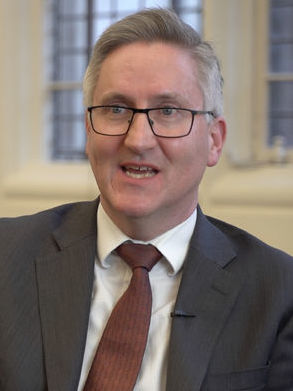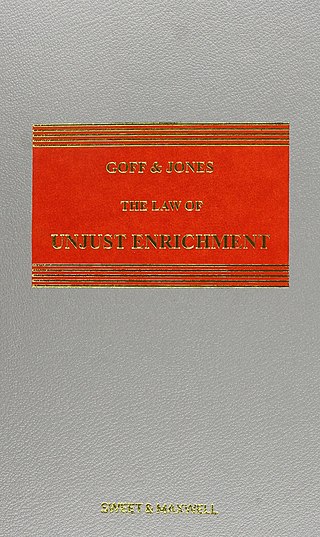Related Research Articles
Restitution and unjust enrichment is the field of law relating to gains-based recovery. In contrast with damages, restitution is a claim or remedy requiring a defendant to give up benefits wrongfully obtained. Liability for restitution is primarily governed by the "principle of unjust enrichment": A person who has been unjustly enriched at the expense of another is required to make restitution.

Graham John Virgo is an English legal academic, barrister and university administrator, who is Professor of English Private Law at the University of Cambridge and Master of Downing College, Cambridge. He is frequently cited in the English courts and those of other common law jurisdictions, and known for his contributions to the law of restitution and the teaching of law. He was previously Senior Pro-Vice-Chancellor at the University of Cambridge and assumed the role of Master of Downing College, Cambridge, on 1 October 2023.
Peter Brian Herrenden Birks was the Regius Professor of Civil Law at the University of Oxford from 1989 until his death. He also became a Fellow of the British Academy in 1989, and an honorary Queen's counsel in 1995. He was a Fellow of All Souls College, Oxford. He is widely credited as having sparked academic enthusiasm for the English law of Restitution, and is often considered to have been one of the greatest English legal scholars of the 20th century.
James W. Harris FBA (1940–2004) was a British solicitor, academic and professor of law at Keble College, University of Oxford.

Robert Lionel Archibald Goff, Baron Goff of Chieveley, was an English barrister and judge who was Senior Lord of Appeal in Ordinary, the equivalent of today's President of the Supreme Court. Best known for establishing unjust enrichment as a branch of English law, he has been described by Andrew Burrows as "the greatest judge of modern times". Goff was the original co-author of Goff & Jones, the leading English law textbook on restitution and unjust enrichment, first published in 1966. He practised as a commercial barrister from 1951 to 1975, following which he began his career as a judge. He was appointed to the Judicial Committee of the House of Lords in 1986.

Andrew Stephen Burrows, Lord Burrows, is a Justice of the Supreme Court of the United Kingdom. His academic work centres on private law. He is the main editor of the compendium English Private Law and the convenor of the advisory group that produced A Restatement of the English Law of Unjust Enrichment as well as textbooks on English contract law. He was appointed to the Supreme Court of the United Kingdom on 2 June 2020. As Professor of the Law of England, University of Oxford and senior research fellow at All Souls College, Oxford at the time of his appointment, he was the first Supreme Court judge to be appointed directly from academia.

Joseph Mordaunt Crook,, generally known as J. Mordaunt Crook, is an English architectural historian and specialist on the Georgian and Victorian periods. He is an authority on the life and work of the Victorian architect William Burges, his biography published in 1981, and reissued in 2013, has been described as "one of the most substantial studies of any Victorian architect".

English trust law concerns the protection of assets, usually when they are held by one party for another's benefit. Trusts were a creation of the English law of property and obligations, and share a subsequent history with countries across the Commonwealth and the United States. Trusts developed when claimants in property disputes were dissatisfied with the common law courts and petitioned the King for a just and equitable result. On the King's behalf, the Lord Chancellor developed a parallel justice system in the Court of Chancery, commonly referred as equity. Historically, trusts have mostly been used where people have left money in a will, or created family settlements, charities, or some types of business venture. After the Judicature Act 1873, England's courts of equity and common law were merged, and equitable principles took precedence. Today, trusts play an important role in financial investment, especially in unit trusts and in pension trusts. Although people are generally free to set the terms of trusts in any way they like, there is a growing body of legislation to protect beneficiaries or regulate the trust relationship, including the Trustee Act 1925, Trustee Investments Act 1961, Recognition of Trusts Act 1987, Financial Services and Markets Act 2000, Trustee Act 2000, Pensions Act 1995, Pensions Act 2004 and Charities Act 2011.
Hector Lewis MacQueen is a Scottish academic, a senior scholar of Scots law and legal history, and a former member of the Scottish Law Commission. He is Professor of Private Law at the University of Edinburgh and a former Dean of its Faculty of Law. He is author, co-author and editor of a large number books on Scottish law and legal history, including the 11th, 12th, 13th and 14th editions of the standard text Gloag & Henderson Law of Scotland, and is former Literary Director of the Stair Society. Stetson University College of Law, Florida, appointedway. He is currently a member of the International Advisory Group for the JKLH-funded project, 'The Paradox of Medieval Scotland, 1093-1286'. In 1995 he became a Fellow of The Royal Society of Edinburgh.
Paul Lyndon Davies KC (Hon), FBA is Allen & Overy Professor of Corporate Law Emeritus at the University of Oxford, Emeritus Fellow of Balliol College, Oxford, Emeritus Fellow of Jesus College, Oxford, and Emeritus Professor of Law at the London School of Economics, where he was the Cassel Professor of Commercial Law from 1998 to 2009. He is an honorary Bencher of Gray’s Inn.
The English law of unjust enrichment is part of the English law of obligations, along with the law of contract, tort, and trusts. The law of unjust enrichment deals with circumstances in which one person is required to make restitution of a benefit acquired at the expense of another in circumstances which are unjust.
The English law of Restitution is the law of gain-based recovery. Its precise scope and underlying principles remain a matter of significant academic and judicial controversy. Broadly speaking, the law of restitution concerns actions in which one person claims an entitlement in respect of a gain acquired by another, rather than compensation for a loss.
Dishonest assistance, or knowing assistance, is a type of third party liability under English trust law. It is usually seen as one of two liabilities established in Barnes v Addy, the other one being knowing receipt. To be liable for dishonest assistance, there must be a breach of trust or fiduciary duty by someone other than the defendant, the defendant must have helped that person in the breach, and the defendant must have a dishonest state of mind. The liability itself is well established, but the mental element of dishonesty is subject to considerable controversy which sprang from the House of Lords case Twinsectra Ltd v Yardley.
Alastair Hudson, FHEA, FRSA, is an English barrister and academic. He is, in 2017/18, employed at the University of Strathclyde, Glasgow and is also visiting professor of law at the University of Portsmouth. He has worked on the University of London International Programmes LLM programme since 2004. He was formerly professor of equity and finance law at the University of Exeter, having previously been professor of equity and finance law at the University of Southampton and, prior to that, professor of equity and law at Queen Mary, University of London. He was appointed a National Teaching Fellow in 2008, a Fellow of the Higher Education Academy, and a Fellow of the Royal Society of Arts. He was voted UK Law Teacher of the Year in 2008. He was awarded the Excellence in Teaching Award 2014 by the University of Southampton Students' Union for "Overall Outstanding Lecturer".
William Lawrence Twining is the Emeritus Quain Professor of Jurisprudence at University College London, having held the post until 1996. He is a leading member of the Law in Context movement, and has contributed especially to jurisprudence, evidence and proof, legal method, legal education, and intellectual history. He has focused recently on "globalization" and legal theory.

El Ajou v Dollar Land Holdings plc[1993] EWCA Civ 4 is an English trusts law case concerning tracing and receipt of property in breach of trust.
A Restatement of the English Law of Unjust Enrichment is a legal treatise by Andrew Burrows, written in collaboration with an advisory group of academics, judges and practitioners. The treatise takes the form of a restatement that is akin to the American Law Institute's highly influential Restatements of the Law. Restatements are very rare in common law jurisdictions other than the United States.

Goff and Jones on the Law of Unjust Enrichment is the leading authoritative English law textbook on restitution and unjust enrichment. First written by Robert Goff and Gareth Jones, it is presently in its tenth edition. It is published by Sweet & Maxwell and forms part of the Common Law Library.
Stephen Michael Cretney, FBA, Hon. QC (1936–2019) was a British legal scholar. He was Professor of Law at the University of Bristol from 1984 to 1993 and then a fellow of All Souls College, Oxford, until 2001.
Anthony Gordon Guest, CBE, KC, FBA, often published as A. G. Guest, is a British barrister and legal scholar. He was professor of English law at the King's College London from 1966 to 1997, having previously been a fellow of University College, Oxford, from 1955 to 1965. He specialises in the law of contracts, especially relating to sale of goods, negotiable instruments and consumer credit.
References
- ↑ "Professor Charles Mitchell appointed Honorary Queen's Counsel". 11 January 2019.
- ↑ "Lord Chancellor welcomes promotion of new silks".
- ↑ "Mitchell, Prof. Charles, (Born 13 May 1965), Professor of Law, University College London, since 2010". Who's Who. 2017. doi:10.1093/ww/9780199540884.013.U289669. ISBN 978-0-19-954088-4.
- ↑ "Dr Charlotte Mitchell". 30 April 2018.
- ↑ "Elections to the British Academy celebrate the diversity of UK research". British Academy. 2 July 2017. Retrieved 29 July 2017.